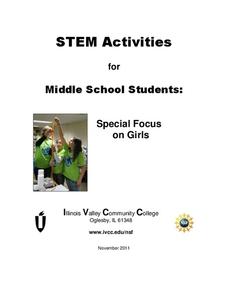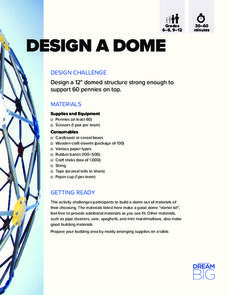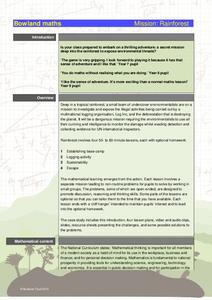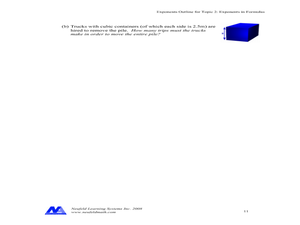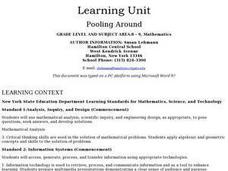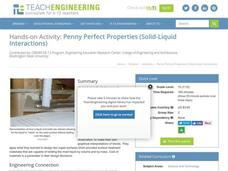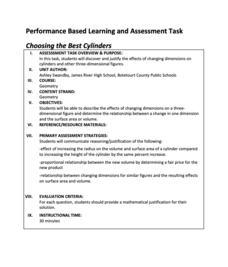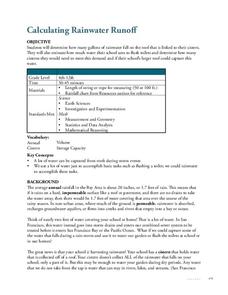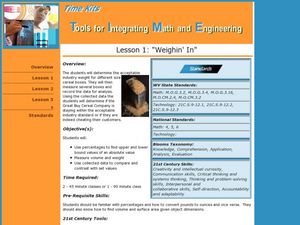Illinois Valley Community College
STEM Activities for Middle School Students
Use STEM activities within the class to provide connections to concepts. The resource includes activities that range from working with buoyancy to building rockets and launching them. Other activities involve the engineering design...
Achieve
Dairy Barn
Agriculture is truly a math-based profession! Help the dairy farmer determine the supplies needed to complete his barn. Using given dimensions, learners build equations and use units to determine the correct amount of materials.
Beyond Benign
Water Bottle Unit
How much plastic do manufacturers use to create water bottles each year? The class explores the number of water bottles used throughout the years to determine how many consumers will use in the future. Class members compare different...
Curriculum Corner
8th Grade Math "I Can" Statement Posters
Clarify the Common Core standards for your eighth grade mathematicians with this series of classroom displays. By rewriting each standard as an achievable "I can" statement, these posters give students clear goals to work toward...
DiscoverE
Design a Dome
Do domed structures have advantages over their less-than-spherical counterparts? Junior architects explore the pros and cons of domes through a design challenge. Teams work together to plan, sketch, build, and test domes created from an...
Bowland
Mission: Rainforest
Young environmentally conscious mathematicians solve a variety of problems related to the central theme of uncovering illegal logging activities. They determine a base camp based on given constraints, investigate logging activities and...
Virginia Department of Education
The Cell Cycle and Mitosis
What a packed instructional activity! Provide your class with the opportunity to learn about the cell cycle in several exciting ways. Biologists first learn about the theory behind mitosis, then proceed to view onion tips under the...
Neufeld Learning Systems
Concept: Exponents in Formulas
In this volume and surface area worksheet, pupils use their calculators to find the volume or surface area of a pictured 3-dimensional figure.
Curated OER
Spheres Multiple Choice
In this volume and surface area learning exercise, learners answer ten multiple choice questions concerning the volume and surface area of various spheres.
Curated OER
Cylinders and Cones Multiple Choice
In this cylinder worksheet, students answer ten multiple choice questions covering lateral area, volume, and surface area. The solutions are available by clicking on the "grade and submit" button found on the bottom left of the page.
Curated OER
A Cylinder Workshop
Students work with given formulas to solve for specific variables. The calculation of the volume of a cylinder and the change in volume when there is a constant surface area is analyzed in this lesson.
Curated OER
Worksheet 5
In this math worksheet, students describe how to define surface area given a variety of situations from word problems. They solve for the volume using calculus.
Curated OER
Functions
In this functions worksheet, 10th graders solve and complete 6 different types of problems. First, they find the largest value of a given function. Then, students determine the values of the constants a, b, c, dso that the curve is a...
Curated OER
Modeling Limits To Cell Size
Students participate in a 'hands-on' activity that simulates the changing relationship of Surface Areas -to- Volume for a growing cell. They assemble models of cells for comparison.
Curated OER
Pooling Around
Students complete a unit of lessons on computing area and volume. They play a Jeopardy game of basic area formulas, calculate surface area of shapes, develop a Powerpoint presentation, and conduct a simulation of finding the surface area...
Curated OER
Using Nets to Find Surface Area
Eighth graders explore three-dimensional objects (prisms, pyramids, cylinders and cones) to draw nets. They use the understanding of drawing nets to find the surface area of pyramids and cylinders.
Teach Engineering
Penny Perfect Properties (Solid-Liquid Interations)
I can get more water to stay on a penny than you can! Collaborative pairs determine the volume of liquids that can be contained on the surface of copper pennies and plastic coins. The pairs analyze their results using graphs and go on to...
Curated OER
Exploring Number and Operation in Secondary Mathematics
Young geometers need a clear understanding of perimeter, volume, and area. This lesson provides a worksheet to help small groups of learners to calculate various measurements of objects and choose the proper units for measurement. It...
Curated OER
Inquiry Unit: Modeling Maximums and Minimums
Young mathematicians explore the maximun area for patio with the added complexity of finding the mimimum cost for construction. First, they maximize the area of a yard given a limited amount of fence and plot width v. area on a scatter...
Radford University
Choosing the Best Cylinders
Don't be fooled: the taller glass doesn't always hold the most. Given the dimensions of different cylindrical containers for beverages and popcorn, pupils calculate the volumes. They see how changing the dimensions affects the volume and...
Radford University
Exploring Coal Pillar Mining
Coal mines can be a gold mine of math applications. After reading some basic information on coal mining, learners draw blueprints of a coal pillar in the shape of a composite figure. They find the volume of material from the coal pillar...
Techbridge Curriculum
Calculating Rainwater Runoff
Thirsty plants soak up every bit of a rainfall, but what happens to the rain that hits the roof? Calculate the amount of rainwater from your school's roof with an Earth science activity, which brings measurement skills, observation...
Curated OER
Tools for Integrating Math and Engineering: Weighin' In
Students collect and analyze data on a fictional cereal company's products. In this measurement instructional activity, students collect data from cereal boxes (weight, volume, surface area, etc.) to determine if the boxes labels...
Curated OER
How Does Cell Size And Shape Affect Transport of Materials
Tenth graders explore concepts of surface area, volume, and ratios, create spreadsheets to aid organization of data collected and provide graphing capabilities, and use NIH Imaging to enable calculations of microscopic organisms.


